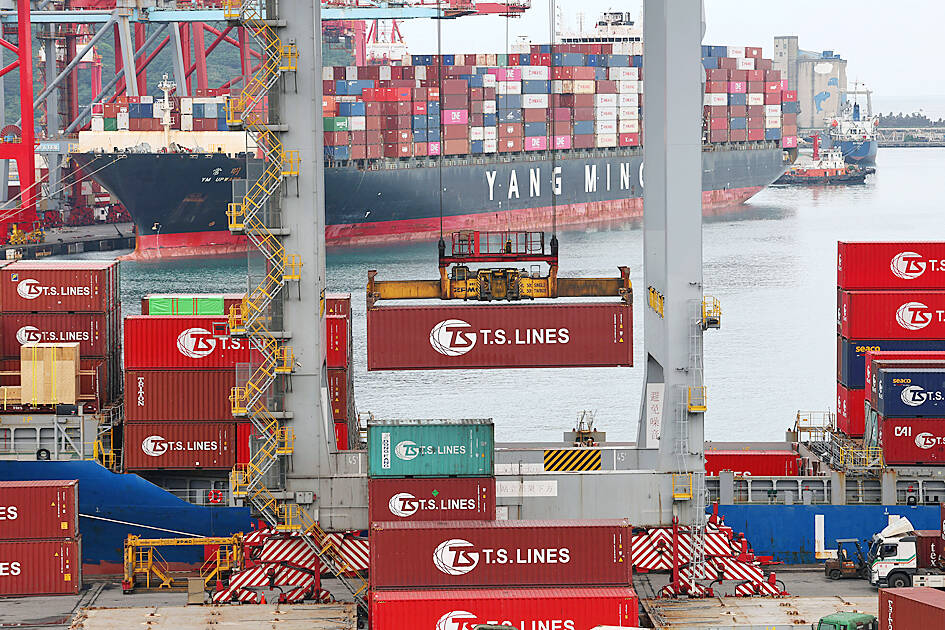Export orders contracted about 18 percent year-on-year to US$42.5 billion last month, as demand for chips and other electronic components remained sluggish due to prolonged inventory adjustments and faltering consumer spending caused by macroeconomic uncertainty, the Ministry of Economic Affairs (MOEA) said yesterday.
Last month’s export orders marked the eighth straight month of decline, with decreases posted across the board. As global economic conditions remain unstable and consumers are cautious about spending on nonessential items, the ministry said it expects export orders to lose further steam this month.
Export orders — measured by product and component shipments to overseas markets over the next one to three months — are this month likely to fall by 23.3 to 26.9 percent annually, reaching US$40.5 billion to US$42.5 billion, the ministry said.

Photo: CNA
On a monthly basis, the best-case scenario would be flat orders, or there could be a fall of 4.7 percent at worst, the ministry said.
“Market demand is still very weak as customers remain in inventory digestion mode,” Department of Statistics Director Huang Yu-ling (黃于玲) said via telephone. “Raw materials and component prices are still hovering at a high level on an annual basis. The prices of flat panels are still lower than the level in the same period of last year.”
However, “the seasonal pattern will arrive this year, meaning orders received in the second half will be higher than the first half. That is what we feel now,” Huang said.
The ministry expects increased demand for emerging technologies such as high-performance computing, artificial intelligence and automotive electronics, which would drive growth momentum for local exporters.
However, rising external risks, including Russia’s invasion of Ukraine, global inflationary pressure and a US-China technology dispute, could hinder the nation’s trade growth momentum, it said.
Last month, orders for electronics products — primarily semiconductors — shrank 21.9 percent annually to US$13.93 billion, due to decreased demand for foundry services, memory chips and other electronic components due to inventory corrections, the ministry said.
Orders for information and communication technology products edged down 0.9 percent to US$12.03 billion, due to lower demand for smartphones, graphics cards and other products, it said.
Optoelectronics orders fell 19 percent to US$1.46 billion, as display and camera lens orders declined, while average selling prices of such products also decreased from a year earlier.
Orders for basic metals such as steel fell 26.5 percent to US$2.16 billion, due to weak steel demand and lower product prices, while machine tools orders decreased 21 percent to US$1.64 billion, as the global economic outlook turned sour and affected manufacturers’ capital investment plans.
Orders for plastics products fell 36.6 percent to US$1.55 billion, while those for petrochemical products decreased 35.1 percent to US$1.43 billion, as customers digested excess inventory amid weak demand, it said.
Other negative factors included increased supply from global rivals and crude oil price cuts by OPEC, the ministry said.

‘SWASTICAR’: Tesla CEO Elon Musk’s close association with Donald Trump has prompted opponents to brand him a ‘Nazi’ and resulted in a dramatic drop in sales Demonstrators descended on Tesla Inc dealerships across the US, and in Europe and Canada on Saturday to protest company chief Elon Musk, who has amassed extraordinary power as a top adviser to US President Donald Trump. Waving signs with messages such as “Musk is stealing our money” and “Reclaim our country,” the protests largely took place peacefully following fiery episodes of vandalism on Tesla vehicles, dealerships and other facilities in recent weeks that US officials have denounced as terrorism. Hundreds rallied on Saturday outside the Tesla dealership in Manhattan. Some blasted Musk, the world’s richest man, while others demanded the shuttering of his

ADVERSARIES: The new list includes 11 entities in China and one in Taiwan, which is a local branch of Chinese cloud computing firm Inspur Group The US added dozens of entities to a trade blacklist on Tuesday, the US Department of Commerce said, in part to disrupt Beijing’s artificial intelligence (AI) and advanced computing capabilities. The action affects 80 entities from countries including China, the United Arab Emirates and Iran, with the commerce department citing their “activities contrary to US national security and foreign policy.” Those added to the “entity list” are restricted from obtaining US items and technologies without government authorization. “We will not allow adversaries to exploit American technology to bolster their own militaries and threaten American lives,” US Secretary of Commerce Howard Lutnick said. The entities

Minister of Finance Chuang Tsui-yun (莊翠雲) yesterday told lawmakers that she “would not speculate,” but a “response plan” has been prepared in case Taiwan is targeted by US President Donald Trump’s reciprocal tariffs, which are to be announced on Wednesday next week. The Trump administration, including US Secretary of the Treasury Scott Bessent, has said that much of the proposed reciprocal tariffs would focus on the 15 countries that have the highest trade surpluses with the US. Bessent has referred to those countries as the “dirty 15,” but has not named them. Last year, Taiwan’s US$73.9 billion trade surplus with the US

Prices of gasoline and diesel products at domestic gas stations are to fall NT$0.2 and NT$0.1 per liter respectively this week, even though international crude oil prices rose last week, CPC Corp, Taiwan (台灣中油) and Formosa Petrochemical Corp (台塑石化) said yesterday. International crude oil prices continued rising last week, as the US Energy Information Administration reported a larger-than-expected drop in US commercial crude oil inventories, CPC said in a statement. Based on the company’s floating oil price formula, the cost of crude oil rose 2.38 percent last week from a week earlier, it said. News that US President Donald Trump plans a “secondary